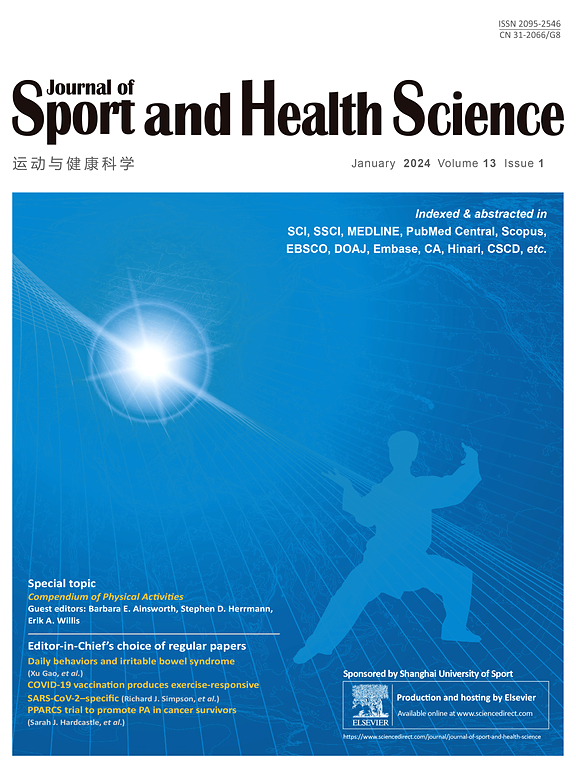Effects of acute exercise or short-term exercise interventions on metabolic markers during experimentally-induced sleep loss in humans: A systematic literature review.
IF 10.3
1区 医学
Q1 HOSPITALITY, LEISURE, SPORT & TOURISM
引用次数: 0
Abstract
BACKGROUND Exercise has positive impacts on metabolic health, whereas sleep loss has potentially negative impacts. This systematic literature review investigates whether acute and short-term exercise interventions can mitigate negative effects of experimentally-induced sleep loss on metabolic markers in humans. METHODS A systematic search (PubMed, Web of Science, Scopus, Embase, SPORTDiscus, and Cochrane) following Preferred Reporting Items for Systematic Reviews and Meta-Analyses 2020 guidelines was conducted up to June 2024 for studies that compared glucose and insulin concentrations, insulin sensitivity, skeletal muscle gene expression, and other molecular markers following an acute or short-term (<14 days) exercise intervention during experimentally-induced sleep loss in adult humans. Articles were considered for inclusion and assessed for eligibility using the PICOS (Population, Intervention, Comparison, Outcomes, and Study design) framework, and critically appraised with the Cochrane Risk of Bias 2.0 tool. RESULTS Of the identified records, 4026 records were screened, with 12 studies meeting all the inclusion criteria and including 177 participants. Sleep intervention varied from a single night of total sleep deprivation to 5 consecutive nights of 4-h sleep opportunity (e.g., early or late sleep restriction), while exercise intervention varied in terms of model (walking/running, cycling, and resistance exercise), volume (e.g., minute to hour), and intensity (e.g., maximum efforts to low-intensity exercise). Most studies indicated a negative effect of insufficient sleep on glucose and insulin concentration as well as mitochondrial adaptations, whereas exercise had a positive impact, mitigating the negative effects on the aforementioned parameters. CONCLUSION Exercise is likely to be effective as a therapeutic intervention for mitigating the negative effects of sleep loss on metabolic markers, at least in short-term intervention studies.急性运动或短期运动干预对实验性睡眠缺失期间人类代谢标志物的影响:系统文献综述。
运动对代谢健康有积极影响,而睡眠不足则有潜在的负面影响。本系统的文献综述探讨了急性和短期运动干预是否可以减轻实验性睡眠缺失对人类代谢标志物的负面影响。方法系统检索(PubMed, Web of Science, Scopus, Embase, SPORTDiscus和Cochrane),根据2020年系统评价和荟萃分析指南的首选报告项目进行系统检索,直到2024年6月,对实验诱导的成人睡眠缺失期间急性或短期(<14天)运动干预后葡萄糖和胰岛素浓度,胰岛素敏感性,骨骼肌基因表达和其他分子标志物进行比较研究。采用PICOS(人群、干预、比较、结果和研究设计)框架对文章进行纳入和合格性评估,并使用Cochrane偏倚风险2.0工具进行严格评价。结果共筛选4026份文献,其中12项研究符合全部纳入标准,纳入受试者177人。睡眠干预从一晚完全睡眠剥夺到连续五晚4小时睡眠机会(例如,早睡或晚睡限制)不等,而运动干预在模式(步行/跑步,骑自行车和阻力运动),量(例如,分钟到小时)和强度(例如,最大限度地进行低强度运动)方面各不相同。大多数研究表明,睡眠不足对葡萄糖和胰岛素浓度以及线粒体适应有负面影响,而运动有积极影响,减轻了对上述参数的负面影响。结论至少在短期干预研究中,运动可能是一种有效的治疗干预措施,可以减轻睡眠不足对代谢指标的负面影响。
本文章由计算机程序翻译,如有差异,请以英文原文为准。
求助全文
约1分钟内获得全文
求助全文
来源期刊

Journal of Sport and Health Science
SPORT SCIENCES-
CiteScore
18.30
自引率
1.70%
发文量
101
审稿时长
22 weeks
期刊介绍:
The Journal of Sport and Health Science (JSHS) is an international, multidisciplinary journal that aims to advance the fields of sport, exercise, physical activity, and health sciences. Published by Elsevier B.V. on behalf of Shanghai University of Sport, JSHS is dedicated to promoting original and impactful research, as well as topical reviews, editorials, opinions, and commentary papers.
With a focus on physical and mental health, injury and disease prevention, traditional Chinese exercise, and human performance, JSHS offers a platform for scholars and researchers to share their findings and contribute to the advancement of these fields. Our journal is peer-reviewed, ensuring that all published works meet the highest academic standards.
Supported by a carefully selected international editorial board, JSHS upholds impeccable integrity and provides an efficient publication platform. We invite submissions from scholars and researchers worldwide, and we are committed to disseminating insightful and influential research in the field of sport and health science.
 求助内容:
求助内容: 应助结果提醒方式:
应助结果提醒方式:


